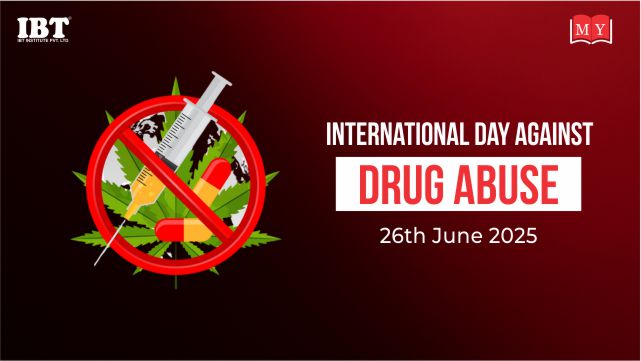International Day Against Drug Abuse: 26th June

International Day Against Drug Abuse and Illicit Trafficking: A Global Call to Action on June 26th
Every year on June 26th, the world observes the International Day Against Drug Abuse and Illicit Trafficking, often referred to as World Drug Day. This significant day, established by the United Nations, serves as a powerful reminder of the profound challenges posed by illicit drugs to individuals, families, communities, and global society. It is a day dedicated to strengthening action and cooperation to achieve a world free of drug abuse and illicit trafficking.
Historical Context and Purpose:
The genesis of this observance dates back to December 7, 1987, when the UN General Assembly, through resolution 42/112, decided to designate June 26th as the International Day against Drug Abuse and Illicit Trafficking. This date was chosen to commemorate the efforts of Lin Zexu, who successfully dismantled the opium trade in Humen, Guangdong, China, just before the First Opium War. This historical context underscores the long-standing global struggle against the menace of drugs.
The primary purposes of International Day Against Drug Abuse and Illicit Trafficking are multifaceted:
-
Raising Awareness: To inform the public about the dangers of drug use, the widespread impact of illicit trafficking, and the devastating consequences on health, security, and socio-economic development.
-
Encouraging Prevention: To promote evidence-based prevention measures, educate communities, especially youth, on the risks of drug use, and encourage healthier lifestyles.
-
Supporting Victims: To provide support and resources for individuals and families affected by drug use disorders, emphasizing compassion, treatment, and rehabilitation.
-
Strengthening International Cooperation: To foster global collaboration among nations, international organizations, and civil society to combat drug trafficking networks, reduce the supply of illicit drugs, and share best practices in prevention and treatment.
-
Advocating for Human Rights: To highlight the importance of human rights in drug policy, ensuring that individuals struggling with drug use disorders are treated with dignity and have access to voluntary, evidence-based services rather than facing stigma and discrimination.
Global Impact and Challenges:
The global drug problem remains a significant public health and security challenge, affecting millions worldwide. Statistics indicate a continuous rise in drug use, with cannabis being the most commonly used drug. Alarmingly, only a fraction of those suffering from drug use disorders receive the necessary treatment, a gap that was exacerbated by the COVID-19 pandemic. Drug-related deaths also continue to be a grim reality.
Illicit drug trade fuels organized crime, corruption, and terrorism, undermining the rule of law and exacerbating instability in many regions. The rise of synthetic drugs presents new and deadly challenges, contributing to overdose deaths and straining healthcare systems.
Actions and Way Forward:
International Day Against Drug Abuse and Illicit Trafficking serves as a catalyst for various actions:
-
Government Initiatives: Ministries and government bodies, such as India's Ministry of Social Justice & Empowerment with its "Nasha Mukt Bharat Abhiyaan" (Drug-Free India Campaign), organize country-wide awareness generation events, workshops, and pledge drives. These initiatives focus on youth, educational institutions, and community outreach.
-
Community Engagement: Local communities, NGOs, and voluntary organizations play a crucial role in implementing awareness programs, establishing support groups, and providing rehabilitation services.
-
International Cooperation: Collaboration between countries is vital to disrupt drug trafficking networks, share intelligence, and implement coordinated strategies to address both the supply and demand aspects of the drug problem. Organizations like UNODC work closely with member states to promote balanced, health- and evidence-based approaches.
-
Evidence-Based Policies: Emphasizing policies rooted in science, research, and respect for human rights is crucial for effective drug control. This includes investing in prevention, ensuring access to treatment and harm reduction services, and promoting alternative livelihoods for communities dependent on illicit drug cultivation.
-
Combating Stigma: A critical aspect of the campaign is to combat the stigma and discrimination faced by individuals who use drugs. By promoting respectful language and attitudes, the day aims to ensure that those struggling with addiction are viewed as patients in need of care, not criminals.
International Day Against Drug Abuse and Illicit Trafficking on June 26th is more than just an observance; it is a vital platform for collective action. It calls upon governments, civil society, communities, and individuals to work together, investing in prevention, promoting treatment, fostering recovery, and ultimately striving for a healthier, safer, and drug-free world.
2 likes |
0 comment
 4.5/5
4.5/5








